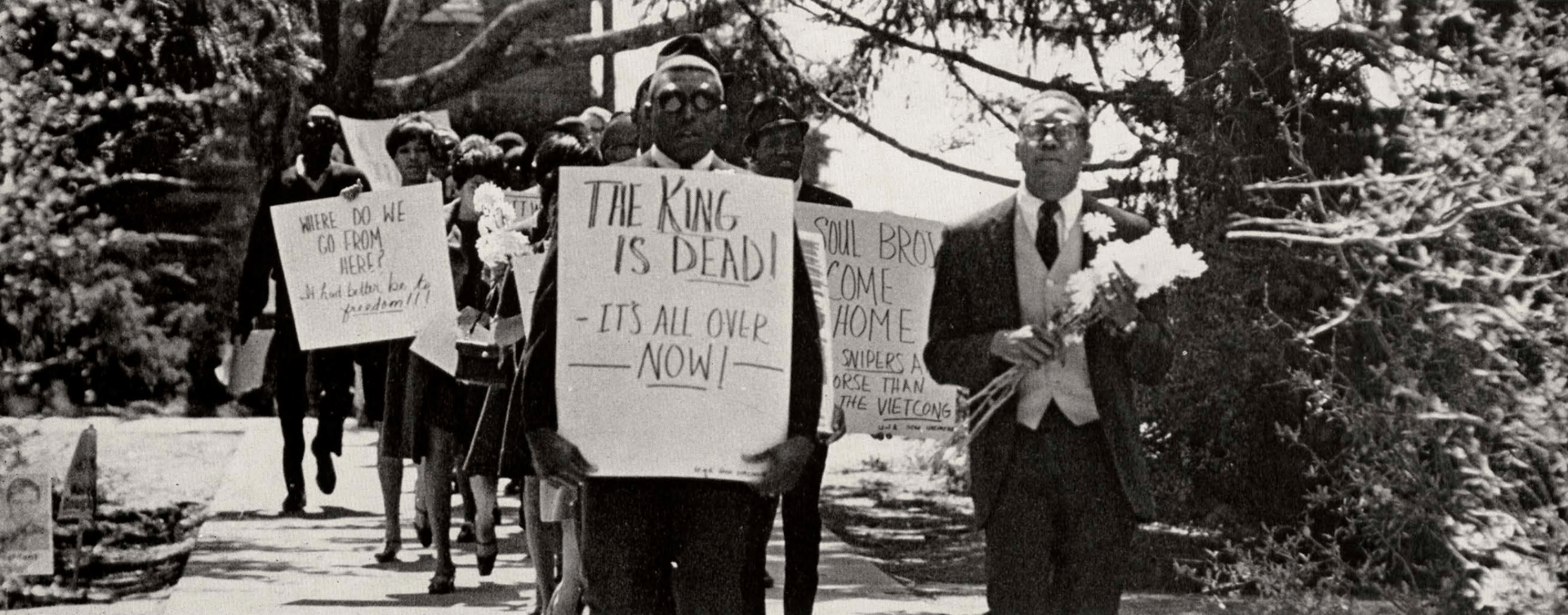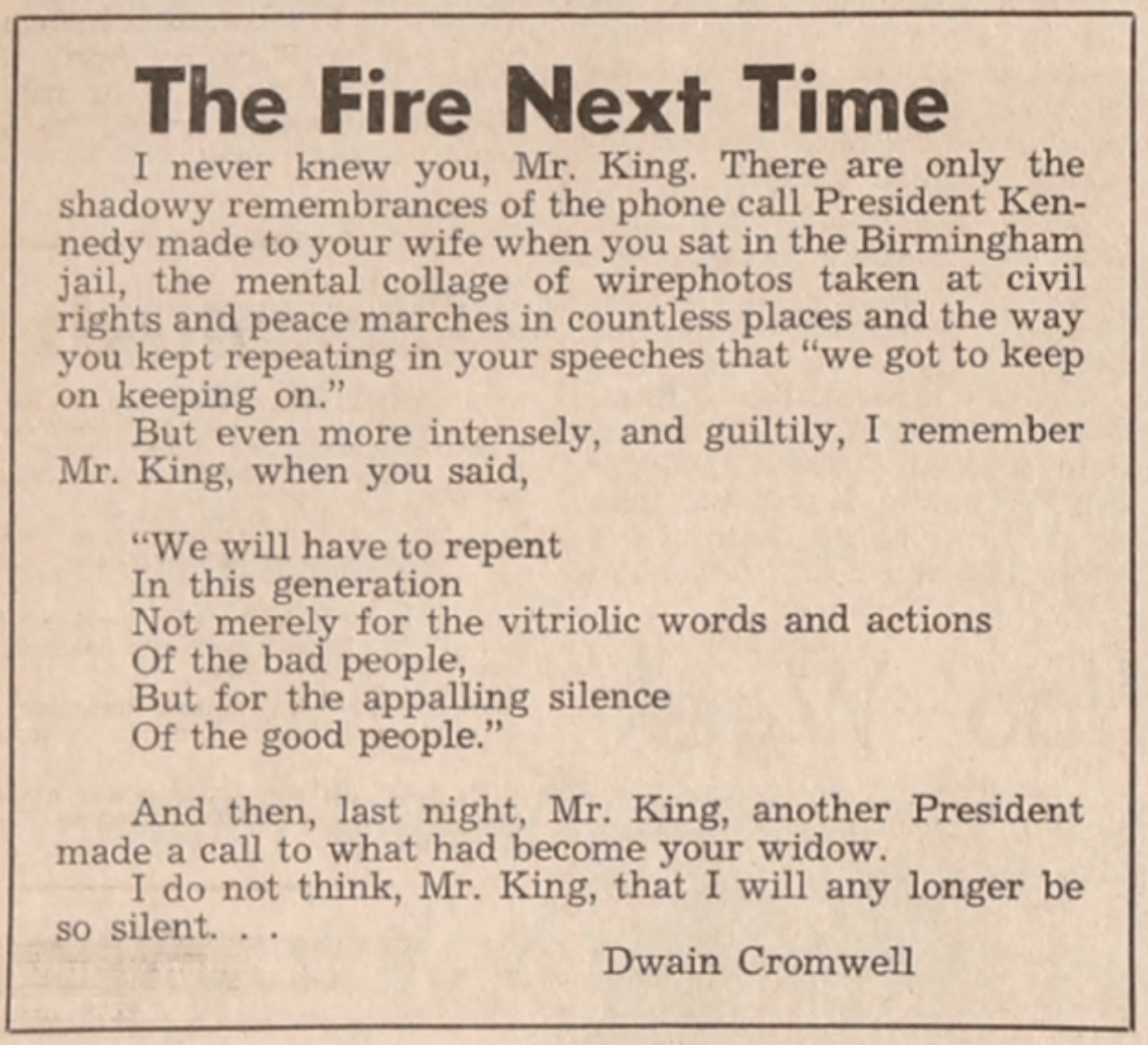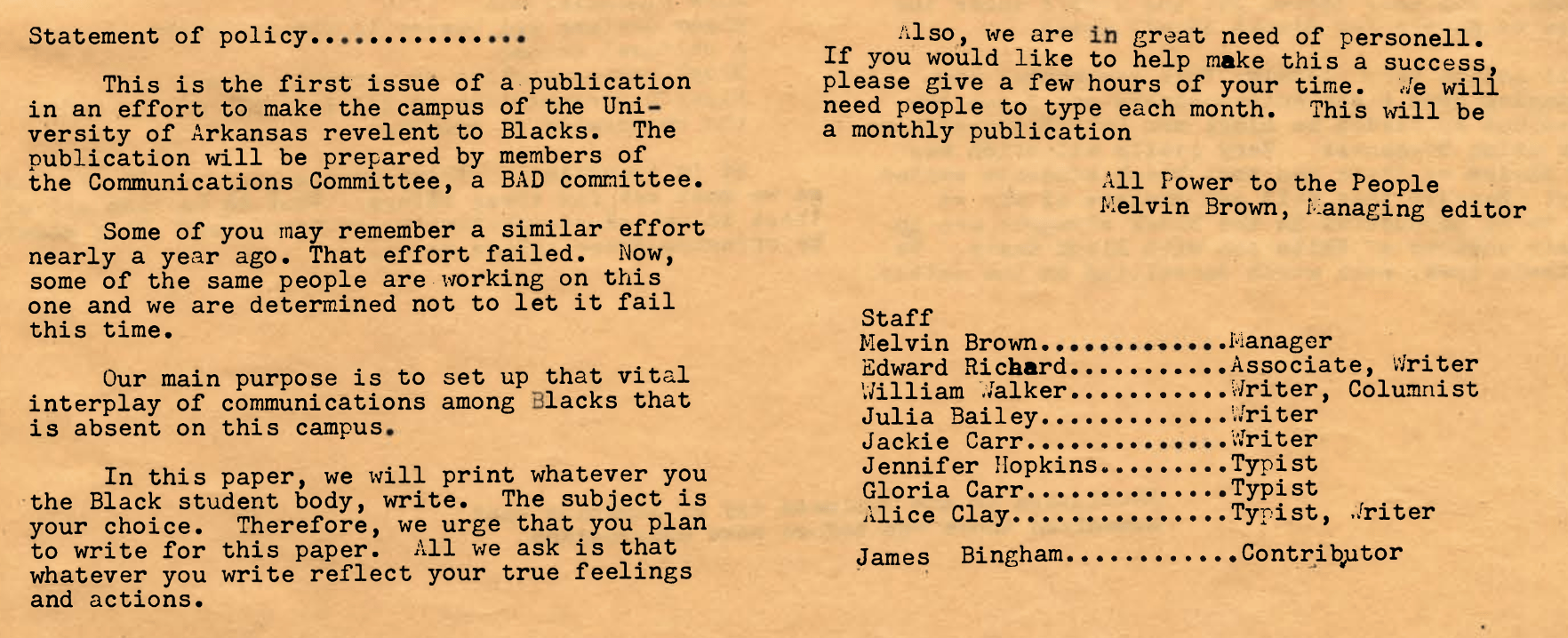
“The King is Dead! It’s All Over Now” read the signs of mourners gathering outside of Vol Walker Hall reflecting and grieving over the loss of the impactful Civil Rights Leader.
Author Bio: Michael Fuhrman is a junior Honors College Fellow majoring in history and psychology and minoring in religious studies from Bryant, AR. Michael is involved on campus with the Associated Student Government serving as the Freshman Leadership Forum Coordinator and serves as the Vice Chair for the Distinguished Lectures Committee. Here, he recounts student reactions to the assassination of Dr. Martin Luther King Jr. at the University of Arkansas and the events that followed.
The University of Arkansas, much like the rest of the country, quickly reacted to the assassination of Martin Luther King Jr. on April 4th, 1968. The day after the assassination a crowd of 150 students gathered in front of Vol Walker Hall to participate in a memorial organized by the U. of A. Soul Unlimited and the Southern Students Organizing Committee. The Arkansas Traveler was quick to write articles on King’s death, including a student’s reflection. Dwain Cromwell, a student from Fort Smith, Arkansas composed an article, titled after James Baldwin’s book The Fire Next Time, in which Cromwell claims that he will no longer remain “so silent” in the face of other’s adversities. While Cromwell hopefully kept to his word, the leadership of The Traveler did not.
 In Provost Charles F. Robinson II and Dr. Lonnie R. William’s book Remembrances in Black: Personal Perspectives of the African American Experience at the University of Arkansas 1940s-2000s, Robinson and Williams interview Black students, faculty and staff who either attended or worked at the University from 1940-2000, including Deborah Hill Thompson. According to Thompson, an elementary education major at the time of King’s assassination, the Traveler failed to advocate for Black students on campus. A letter from a white student on campus filled with derogatory remarks towards Black students and condemning the nation’s excessive reaction to King’s death was published. When a Black student submitted a letter refuting the student’s racist comments, the Traveler refused to publish the rebuttal, ultimately giving priority to the white voice. Soon after this incident, Black students on campus organized a protest of the Traveler, barricading all entrances to then Hill Hall and preventing the production of the newspaper and all classes held in the building.
In Provost Charles F. Robinson II and Dr. Lonnie R. William’s book Remembrances in Black: Personal Perspectives of the African American Experience at the University of Arkansas 1940s-2000s, Robinson and Williams interview Black students, faculty and staff who either attended or worked at the University from 1940-2000, including Deborah Hill Thompson. According to Thompson, an elementary education major at the time of King’s assassination, the Traveler failed to advocate for Black students on campus. A letter from a white student on campus filled with derogatory remarks towards Black students and condemning the nation’s excessive reaction to King’s death was published. When a Black student submitted a letter refuting the student’s racist comments, the Traveler refused to publish the rebuttal, ultimately giving priority to the white voice. Soon after this incident, Black students on campus organized a protest of the Traveler, barricading all entrances to then Hill Hall and preventing the production of the newspaper and all classes held in the building.
Because of these and other incidents, Black students on campus still did not feel as though they were given an equal voice to spread information through the Traveler. Therefore, the student group Black Americans for Democracy (BAD), created their own newspaper called the BAD Times. Running from 1971-1977, BAD Times led the largest Black student group on campus to create an even more solidified community. Through the paper BAD would promote Black student events on campus (such as the Miss BAD beauty pageant), highlight Black athletes, and update students on the progress made towards racial equality.

A detailed statement of purpose that concluded the first edition of BAD Times. Photo courtesy of the BAD Times Digital Collection, University of Arkansas.
Reflecting on the words of Cromwell, it is easy as a white student to talk about the next time, changing our perspectives and wanting to join the fight towards racial justice. However, it is the thought of “next time” that makes it easy. The murder of George Floyd, much like the assassination of Martin Luther King Jr., saw a rise in social activism fighting toward racial equality. As a white student on campus, there are tangible ways we can begin to learn more about the history of injustice on our campus and fight for the solutions to these systemic issues. BAD Times is a testament to how communities will fight to lift their own voice if not given a fair chance in the existing system. It is time to stand with these voices now. There is no more “next time.”
The Honors College is currently hosting a Honors College Forum titled BAD Times. The class is led by Provost Charles F. Robinson II. The classes are recorded and saved on the Honors College Youtube page at the following link: https://www.youtube.com/playlist?list=PLxMMAUw9ciMSiqV-RFC54ABz9V8zu0yDw
Sources:
Robinson II, Charles F., and Lonnie R. Williams. Remembrances in Black: Personal Perspectives of the African American Experience at the University of Arkansas, 1940s-2000s. Fayetteville: University of Arkansas Press, 2010.
University of Arkansas Digital Collections, Arkansas Traveler Collection. https://digitalcollections.uark.edu/digital/collection/Traveler
University of Arkansas Digital Collections, BAD Times Collection. https://digitalcollections.uark.edu/digital/collection/BADTimes
University of Arkansas Digital Collections, Razorback Yearbook Collection. https://digitalcollections.uark.edu/digital/collection/Razorbacks
